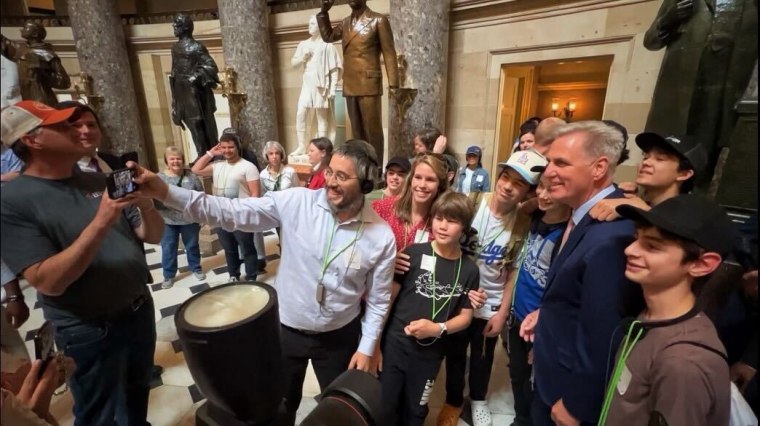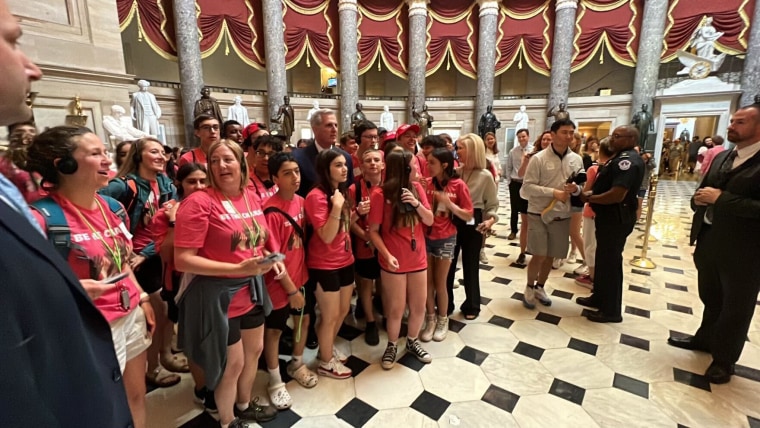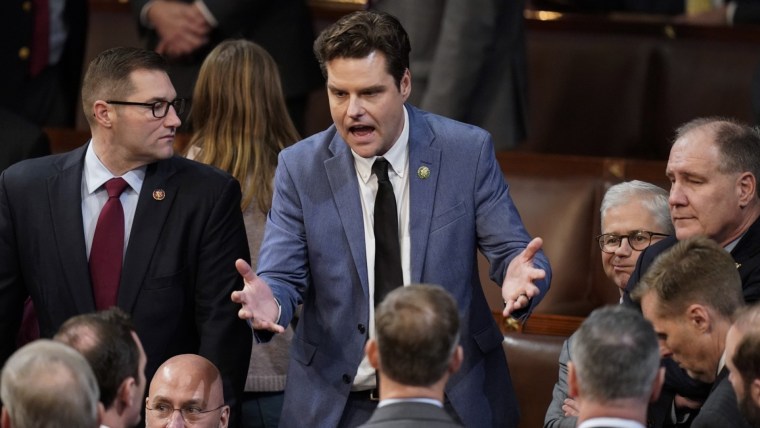[ad_1]
WASHINGTON — If there was a theme for Kevin McCarthy’s jam-packed first five months as speaker, it would be this: You only live once.
In April, he followed in the footsteps of his political idol, fellow California Republican Ronald Reagan, delivering a major address on Wall Street. Then he hosted Taiwanese President Tsai Ing-wen at Reagan’s presidential library, infuriating Beijing. Last month, McCarthy met King Abdullah II in Jordan, Prime Minister Benjamin Netanyahu in Israel and Pope Francis at the Vatican.
Since seizing the coveted speaker’s gavel after 15 grueling rounds of voting, McCarthy has embraced the role of happy warrior, frequently stopping to ask tourists if they want to snap a selfie or photo with him and sparring with reporters in the Capitol’s marble halls on a daily basis.
Facing fresh threats of being ousted from the right, McCarthy has filled up his calendar and capitalized on every moment as speaker as the Washington establishment openly speculates how long he can hang on.
“I don’t think he knows when it’s going to happen,” said one House Republican lawmaker who supported McCarthy for speaker, “but he’s planning just like it’s going to happen tomorrow.”
Speakerships are “ephemeral — just like all of our time here in Congress,” quipped Rep. Andy Biggs, R-Ariz., a former leader of the ultraconservative Freedom Caucus and one of the “Never Kevins” who tried to block McCarthy from the top job.
“Republican speakers typically don’t have a long shelf life given the dynamics of the conferences these days,” said former Rep. Charlie Dent, R-Pa., who witnessed the Freedom Caucus push out Speaker John Boehner in 2015, deny McCarthy the gavel, then torment Speaker Paul Ryan before he, too, left Congress in 2019.
“Maybe he can break the trend,” Dent said of McCarthy. “He’s doing what every other speaker would be doing but … maybe a little bit more on an accelerated timeline.”
In between the big speeches and summits, that he’s imbued with symbolism, McCarthy has been putting his own personal mark on the speakership. Eschewing the sterile House Studio A that had been used by his predecessors — Speakers Boehner, Ryan and Nancy Pelosi — McCarthy has been holding his news conferences in hallways and rooms previously not used for such events, including the tiny foyer outside his office and the echoey Statuary Hall.

During the debt standoff, he appeared to relish going toe-to-toe with the press, holding lengthy impromptu gaggles until reporters ran out of questions. And instead of delegating the task to rank-and-file members, McCarthy makes the short walk to the chamber to open the House floor almost every day.
In his opening months, he also struck a major deal with President Joe Biden to lift the debt ceiling and cap spending — a crowning legislative achievement. But that same bipartisan agreement has only fueled more speculation that McCarthy’s days in the speaker’s office could be numbered.
After the deal, a handful of McCarthy’s conservative foes have openly threatened a “motion to vacate” that would force a vote of no confidence on the House floor. And that same band of rebels paralyzed the House this week when it joined Democrats in blocking a suite of GOP messaging bills, undermining Republicans’ fragile majority and embarrassing McCarthy’s leadership team.
“It’s surprising to me how many people have called suggesting we need a different speaker,” said Biggs, one of the 11 conservatives who voted to block the GOP messaging bills.
New York Rep. Gregory Meeks, the top Democrat on the Foreign Affairs Committee, said some Republicans are “so frustrated” by the GOP infighting they have privately suggested that “maybe there could be a coalition government” with moderate Democrats and Republicans, though he declined to name those members.

Meanwhile, McCarthy allies have aggressively pushed back on the idea that the speaker is a short-timer who’s trying to quickly check off all of the boxes of the job before a hasty exit. They argue that McCarthy, who served in leadership for 14 years before he fulfilled his lifelong ambition of becoming speaker, has had plenty of time to think and plot out what he’d like his speakership to look like.
“I think he’s been thinking about what he’d liked to do for a long time,” said Rep. David Rouzer, R-N.C., who has served with McCarthy over the past eight years. “He’s always been a very energetic, thoughtful leader that knows what he wants to do.”
His allies also downplayed his meetings with foreign leaders, saying it simply comes with the role of being speaker, second in line to the presidency after Vice President Kamala Harris. This week, McCarthy met with new United Kingdom Prime Minister Rishi Sunak. And he’ll host his second joint session with a foreign leader on June 22, when Indian Prime Minister Narendra Modi addresses Congress.
“That’s what you do as speaker,” said Rep. Darin LaHood, R-Ill, comparing McCarthy’s meetings with world leaders to Pelosi’s. “I think Kevin thrives in those instances, and it’s part of the job, frankly, so I don’t think it’s anything unusual.”
Sen. Lindsey Graham, R-S.C., a former House member who was part of a coup attempt to oust then-Speaker Newt Gingrich in the 1990s, said GOP speakers will always face challenges from small conservative factions vying for power and influence.
“It’s always been that way, it always will be that way. … I was in those factions,” Graham said. McCarthy, he added, has “done a pretty darn good job.”

Perhaps no one is more familiar with these dynamics than the 58-year-old McCarthy. McCarthy spent years serving and studying under Speakers Boehner and Ryan as they clashed with the Freedom Caucus — the same rump group of conservatives that blocked McCarthy from the top job in October 2015 and nearly ended his political career. Now Gingrich, a mentor, regularly meets with McCarthy in the Capitol.
But McCarthy is operating with a much smaller majority than Boehner or Ryan had, complicating his ability to govern his GOP conference even more.
Asked repeatedly this week whether his speakership was in jeopardy, McCarthy remained both optimistic and defiant. He said he’s not concerned about a potential threat of a motion to vacate, and he’s confident he’ll be able to serve out the rest of his two-year term, arguing that his success will add to his reputation that he’s an underdog who keeps proving his critics wrong.
“I always think tension only makes you stronger. Conflict makes you stronger, if you deal with it. If you avoid it, it will perpetuate and become a bigger problem.” McCarthy told reporters.
“I enjoy this work,“ he said. “I enjoy this job. I enjoy this conflict.”
[ad_2]
Source link

